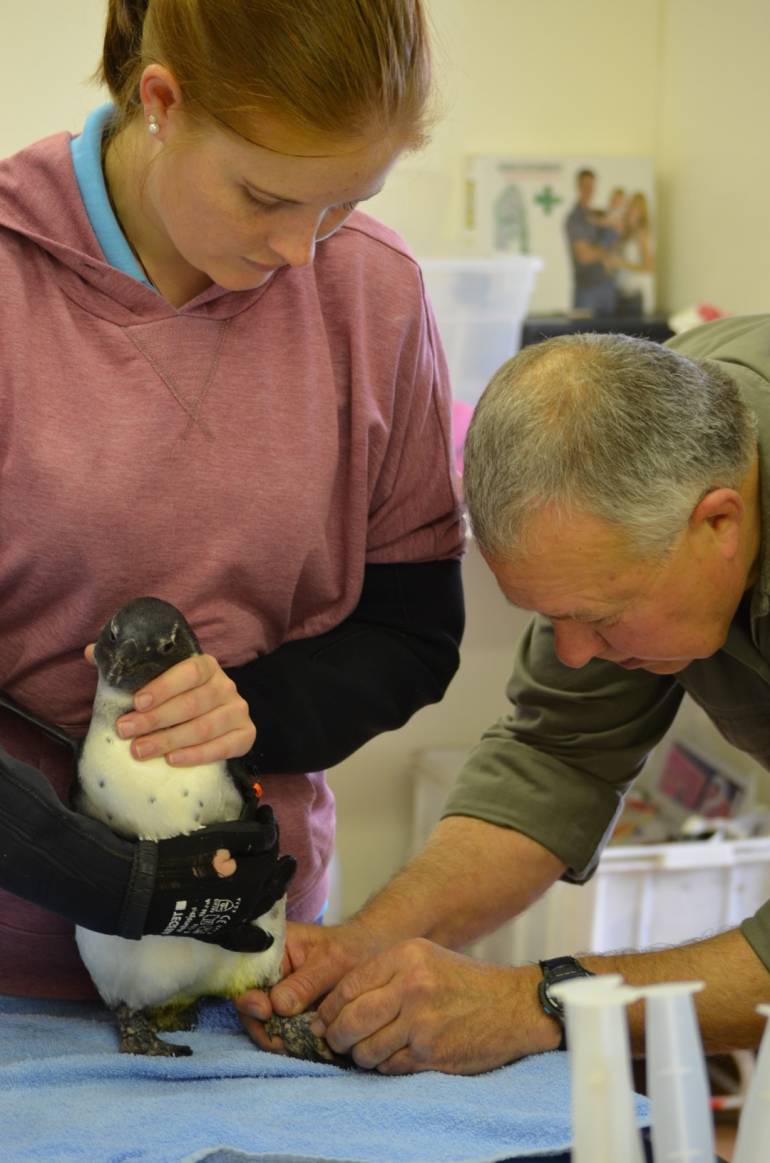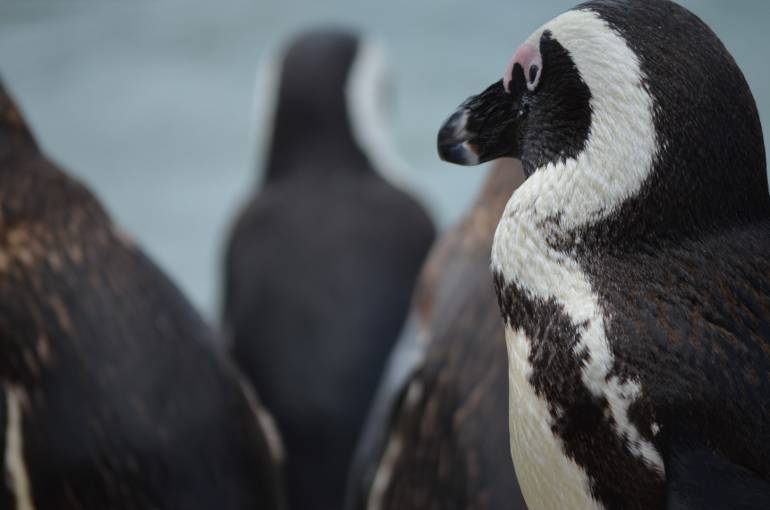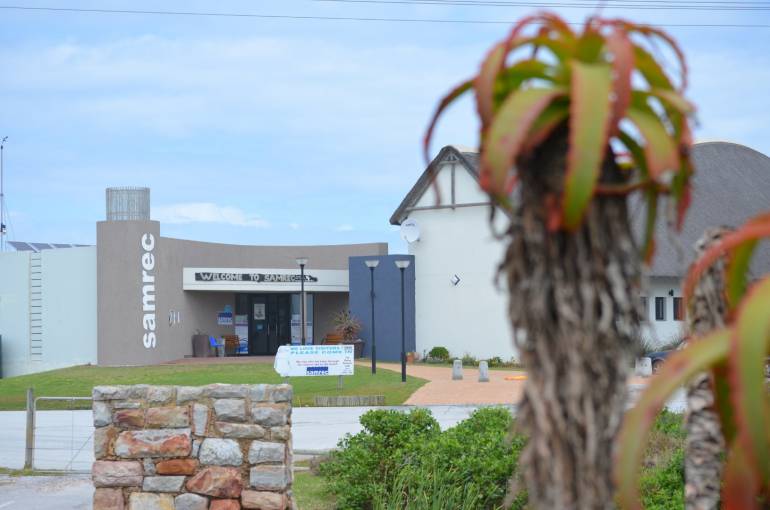Conserving the African penguin
October is National Marine Month and serves to create awareness of South Africa's marine and coastal environments and the benefits that our oceans bring to our nation.
South Africa is nestled between two currents, the warm Agulhas current with its rich ocean biodiversity, and the cold Benguela system that supports large fisheries. The Agulhas Current flows south westwards along the continental shelf edge of the east coast of South Africa (about 50 km offshore of Algoa Bay) and dominates large-scale ocean features in the region.
Algoa Bay, the coastal region of Nelson Mandela Bay, boasts 40 km of magnificent golden beaches. Within Algoa Bay the opportunity exists of seeing Cape Fur Seals, numerous sea birds, numerous shipwrecks and sometimes even pods of dolphins and whales.
Most importantly Algoa Bay is home to the largest breeding colony of the African penguin. The African penguin is found on the south-western coast of Africa, living in colonies on 24 islands between Namibia and Algoa Bay, near Port Elizabeth, South Africa. It is the only penguin species that breeds in Africa. 5,000 breeding pairs were estimated to live in Namibia in 2008; in 2009, about 21,000 pairs were estimated to live in South Africa, with the majority of those numbers on St. Croix Island in Algoa Bay.
Algoa Bay is home to the largest breeding colony of the African penguin. (Photo by Raggy Charters)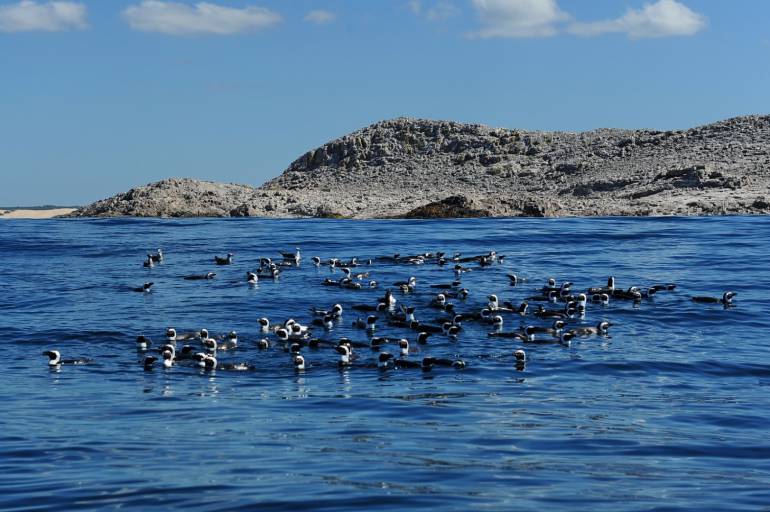
Most interestingly the African penguins were originally Island dwellers and colonies only started to occur on the African Mainland recently. Two colonies were established by penguins in the 1980s on the mainland near Cape Town, namely Boulders Beach near Simon's Town and Stony Point in Betty's Bay. Mainland colonies probably only became possible in recent times due to the reduction of predator numbers, although the Betty's Bay colony has been attacked by leopards in the past. The only other mainland colony is in Namibia, but it is not known when it was established.
In the last decade the numbers of the penguins have decreased. According to SAMREC, one of the causes of the decline in numbers of African penguins is that the cold currents in which penguins find their food have been pushed further out to sea. This result in them having to swim almost 60 kilometres away from their burrows and by the time they get back to feed their babies, much of the food has been digested so the chicks are not fed properly and therefore take longer to fledge. This has a domino effect as the parents start moulting before the chicks fledge, once in a moult they can’t swim and find food so the chicks suffer even more. When the chicks are left to fend for themselves, they don’t know how to catch fish and in their weakened state they can't cope with the elements and so they are washed up on our beaches.
This is where the South African Marine Rehabilitation and Education Centre - SAMREC gets involved. SAMREC is Port Elizabeth's marine bird rehabilitation and education centre situated in the Cape Recife Nature Reserve.
When the birds arrive they get weighed and "checked in" by completing a registration form and then gets named. SAMREC names them using the alphabet. They start with the letter A and work down to the letter Z and then start from A again. Some of the names can be quite interesting so please ask about this when you do the tour. Sometimes those bringing in stranded birds get the opportunity to name them. Dorris and Eve are the latest addistions to the penguin family.
After being named they get a good bath and a good dose of "darrows", which is an electrolyte solution used to rehydrate them. The penguins are then fed starting off with "Tails" what they call small pieces of fish, and then later on whole fish. The larger fish also assist with giving the penguins tablets and are hidden in the gills of the fish. The penguins have a specific rehabilitation program at SAMREC and they explain more about this on their very interesting guided tours.
The centre's purpose isn't just to rescue and rehabilitate, but to also inform and educate the public through their different educational programs. Visitors can experience the hospital and see the volunteers in action helping to save our environment, and in particular the endangered African Penguin.
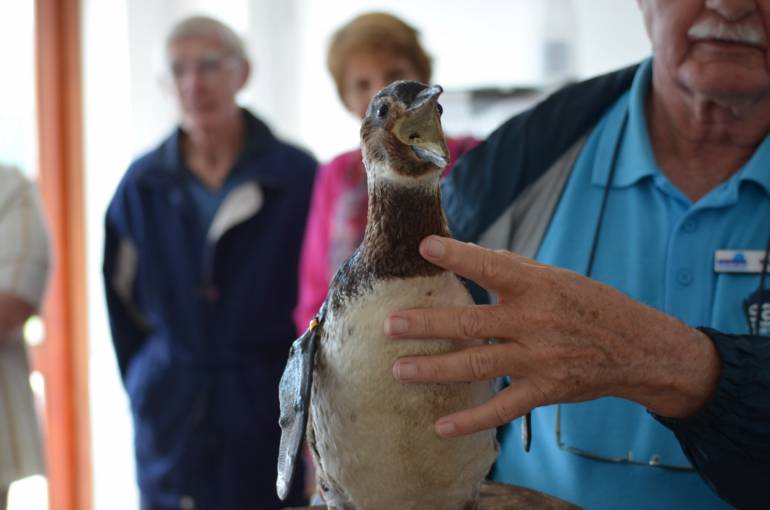
The centre's purpose isn't just to rescue and rehabilitate, but to also inform and educate the public through their different programs.
You can also help preserve the African penguin, please contact or visit SAMREC to find out how. The penguins get released regularly and the public is welcome to see the penguins returning to the Algoa Bay.
SAMREC is also one of the products visitors can experience with the Nelson Mandela Bay Pass, read more...
Categories
Featured Posts
-
Unleash the Summer: Essential Travel Hacks for Saving, Safety and Smart Packing
As the temperature rises and the days grow longer, the allure of summer travel becomes…
-

Gqeberha: Tales of Adventure and Exploration
Although this adventure quote might sound cliche and a bit overused, it’s one thing that…
-

101 Things to do in and around Nelson Mandela Bay (Port Elizabeth/Gqeberha)
With an abundance of things to see and do in and around Gqeberha (Port Elizabeth), it is…
